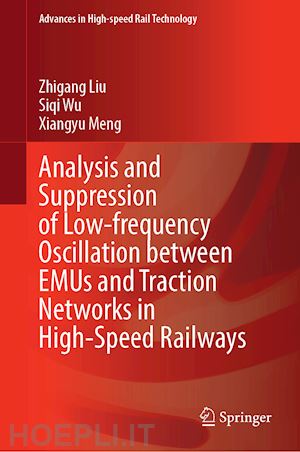
Questo prodotto usufruisce delle SPEDIZIONI GRATIS
selezionando l'opzione Corriere Veloce in fase di ordine.
Pagabile anche con Carta della cultura giovani e del merito, 18App Bonus Cultura e Carta del Docente
This book focuses on the low-frequency oscillation between EMUs and traction networks in high-speed Railways. As the power source of high-speed trains, the traction network's power performance directly affects the safe and stable operation of the train. However, the low-frequency oscillation between EMUs and traction networks will fluctuate voltage or current, resulting in poor power quality, electrical device failure, and even interruption of traction power. Therefore, it is important to reveal the mechanism of low-frequency oscillation and propose suppression strategies. This book systematically shows the newest research results of analysis and suppression of low-frequency oscillation between EMUs and traction networks in high-speed railways, especially in the modeling methods of vehicle-grid systems and suppression strategies for low-frequency oscillation. These methods or strategies can provide important references and help for researchers, scholars, and engineers on traction power technology in high-speed railways. The main contents include the overview of low-frequency oscillation between EMUs and traction networks, the introduction of main modeling methods for vehicle-grid systems, especially single-phase rectifiers, the line-side converter control algorithms in vehicles for the suppression of low-frequency oscillation, the traction substation power compensation strategies for the suppression of low-frequency oscillation, etc.
Overview of Low-Frequency Oscillation in Railways Vehicle-Grid Systems.- Vehicle-Grid System Model in Time Domain and Oscillation Mechanism Analysis.- Vehicle-grid System Model in Frequency Domain and Oscillation Mechanism Analysis.- Impedance Model Under Unified Framework and Their Relations.- Suppression of Low-frequency Oscillation Based on Model Predictive Control.- Suppression of Low-frequency Oscillation Based on Passivity-based Control.- Suppression of Low-frequency Oscillation Based on Fuzzy Control.- Comparative Analysis for the Traction Converters in Vehicle-Grid System of High-speed Railway.- Dynamic Power Compensation and its Suppression Mechanism.
Zhigang Liu (IEEE Fellow, IET Fellow, AAIA Fellow) received the Ph.D. degree in Power system and its Automation from Southwest Jiaotong University, China, in 2003. He is currently Full Professor of the School of Electrical Engineering, Southwest Jiaotong University, Chengdu. He is also Guest Professor of Tongji University. Shanghai. He has authored three books and published more than 200 peer-reviewed journal and conference articles. His research interests include the electrical relationship of EMUs and traction, detection, and assessment of pantograph-catenary in high-speed railway. Dr. Liu is Associate Editor-in-Chief of IEEE Transactions on Instrumentation and Measurement and Associate Editor of IEEE Transactions on Neural Networks and Learning Systems, IEEE Transactions on Intelligent Transportation Systems, IEEE Transactions on Vehicular Technology, and IEEE Access. He received IEEE TIM's Outstanding Associate Editors for 2019, 2020, and 2021 and Outstanding Reviewer of IEEE Transactions on Instrumentation and Measurement in 2018.
Siqi Wu (IEEE Graduate Student Member) received her Ph.D. degree in Electrical Engineering from the School of Electrical Engineering, Southwest Jiaotong University (SWJTU), Chengdu, China, in 2022. From 2021 to 2022, she was Visiting Ph.D. Student at the Department of Electrical and Computer Engineering, the University of British Columbia, Vancouver, Canada. She had also served as Chair of IEEE SWJTU Student Branch (STB11458) since 2021 and General Conference Chair and Technical Program Committee Chair of the 2nd China International Youth Conference on Electrical Engineering (IEEE CIYCEE 2021). She is currently Postdoc Researcher at the Department of Electrical Engineering, the Hong Kong Polytechnic University, Hong Kong, China. Her research interests include the control, modeling, and stability analysis of power electronics-based systems. She has published 14 SCI/EI journal papers and 5 conference papers.
Xiangyu Meng (IEEE Student Member) received the B.S. degree in Electrical Engineering from Lanzhou Jiaotong University, Lanzhou, China, in 2019. He is currently pursuing the Ph.D. degree in electrical engineering from Southwest Jiaotong University. From 2021 to 2022, he served as Chair of the IEEE IAS Student Branch Chapter at Southwest Jiaotong University (SBC11458). He was also General Conference Chairman of the 2nd China International Youth Conference on Electrical Engineering (CIYCEE 2021) in 2021. His research interests include impedance model and stability analysis of railway vehicle-grid systems and design of large-scale renewable energy sources integration into power systems. He has published 8 SCI/EI journal papers and 2 conference papers. He received the Best Paper Award of the 5th International Conference on Electrical Engineering and Information Technologies for Rail Transportation (EITRT), in 2021.











Il sito utilizza cookie ed altri strumenti di tracciamento che raccolgono informazioni dal dispositivo dell’utente. Oltre ai cookie tecnici ed analitici aggregati, strettamente necessari per il funzionamento di questo sito web, previo consenso dell’utente possono essere installati cookie di profilazione e marketing e cookie dei social media. Cliccando su “Accetto tutti i cookie” saranno attivate tutte le categorie di cookie. Per accettare solo deterninate categorie di cookie, cliccare invece su “Impostazioni cookie”. Chiudendo il banner o continuando a navigare saranno installati solo cookie tecnici. Per maggiori dettagli, consultare la Cookie Policy.